

Do you have a hard time justifying your time spent on social media to your boss or your clients?
If so -- it might be because you're not selling the full range social media benefits for their small business or startup.
When you show people exactly how they can use social media to get ahead of their competition -- they suddenly start paying attention.
We all know that social media is great for building awareness and engagement with current and potential customers.
But what are the benefits beyond that?
Your boss may like the idea of building fans. Your clients may like the idea of going viral...
But they'll both be more on board if you can show them all the ways their business will benefit from social media beyond social media itself.
In this post, I'll share 9 creative ways to use social media to market your small business or startup.
How to Use Social Media to Market Your Small Business
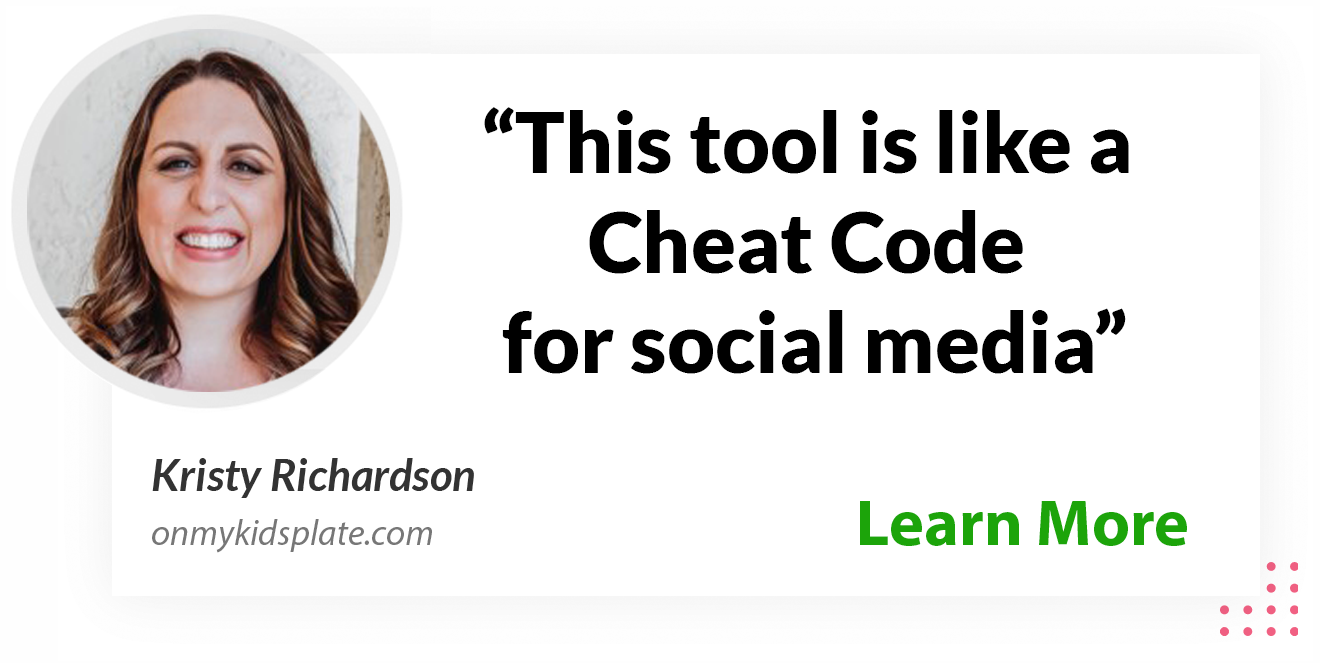
Use Social Media to Market Your Small Business -- Advertising
Social media advertising can solve a lot of issues for many small businesses and startups.
For starters, if you're not getting good results with paid search advertising -- you may need more targeting options than just keywords and locations.
Social media advertising platforms give you those more advanced targeting options.
For example, Facebook gives you all this.
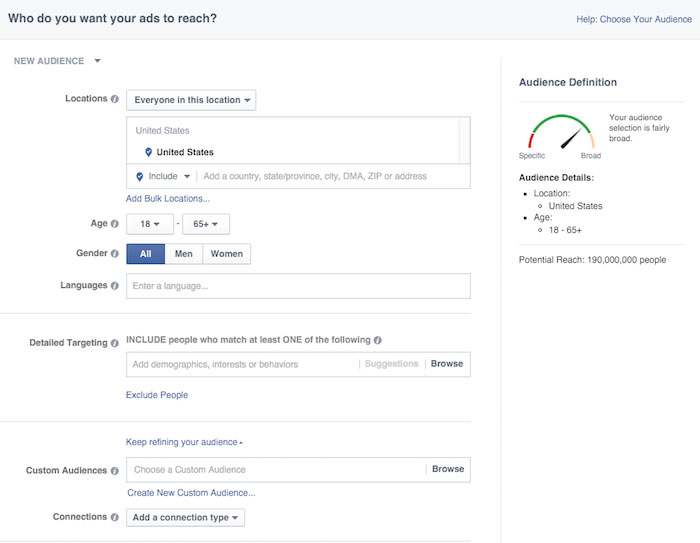
While it's hard to tell at first glance, Facebook's detailed targeting allows you to select the following:
- Demographic categories including: education, ethnic affinity, financial, generational, home, life events, parents, politics, relationship and work.
- Interests categories including: business, entertainment, family, fitness, food, hobbies, shopping, sports, and technology.
- Behavior categories including: automotive, B2B, charitable donations, consumer classification, digital activities, expats, financial, job role, media, mobile device user, purchase behavior, residential profiles, seasonal and travel.
And if those aren't enough, you can also target your Facebook ads to people who have visited any page on your website (or specific pages), people on your email list, people in your customer database, people on your SMS list or other customer databases owned by your business.
Twitter offers similar audience targeting in their social media advertising platform -- including the ability to target people who have visited any page on your website (or specific pages), people on your email list, people in your customer database, people on your SMS list or other customer databases owned by your business.
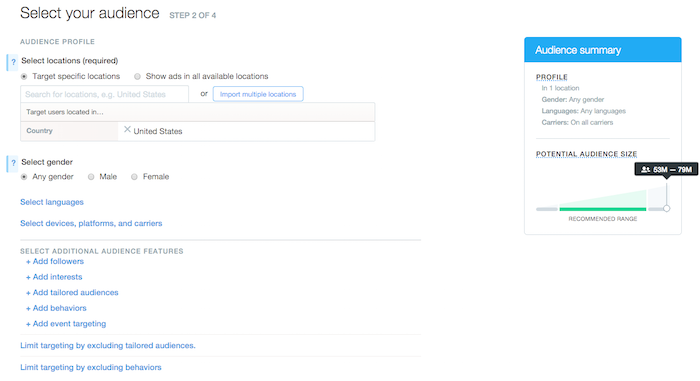
For B2B, LinkedIn also offers a powerful social media advertising platform that allows you to target ads to audiences using the following criteria.
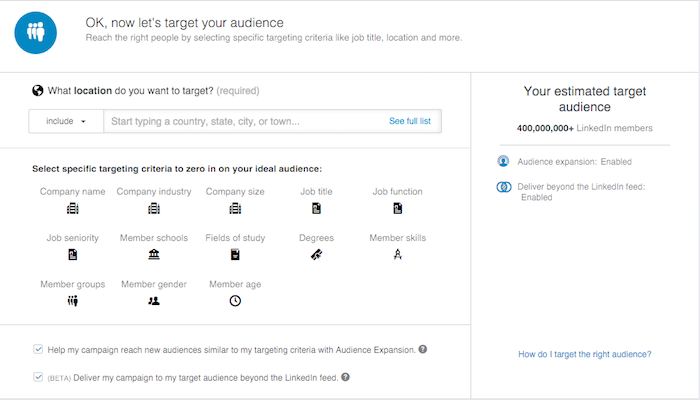
This is definitely one effective way to use social media to market your small business or startup.
It's a smart use of your advertising budget.
It's also a fast way to reach social media audiences long before you've built up your business's fans and followers organically.
Use Social Media to Market Your Small Business -- Analytics
Google Analytics is essential for any business or startup.
But social media can tap into the more personal side of your company's analytics.
While Google Analytics does have breakdowns of your website visitors age brackets, gender, and general interest groupings, Facebook Audience Insights has even more (based on your fan base).
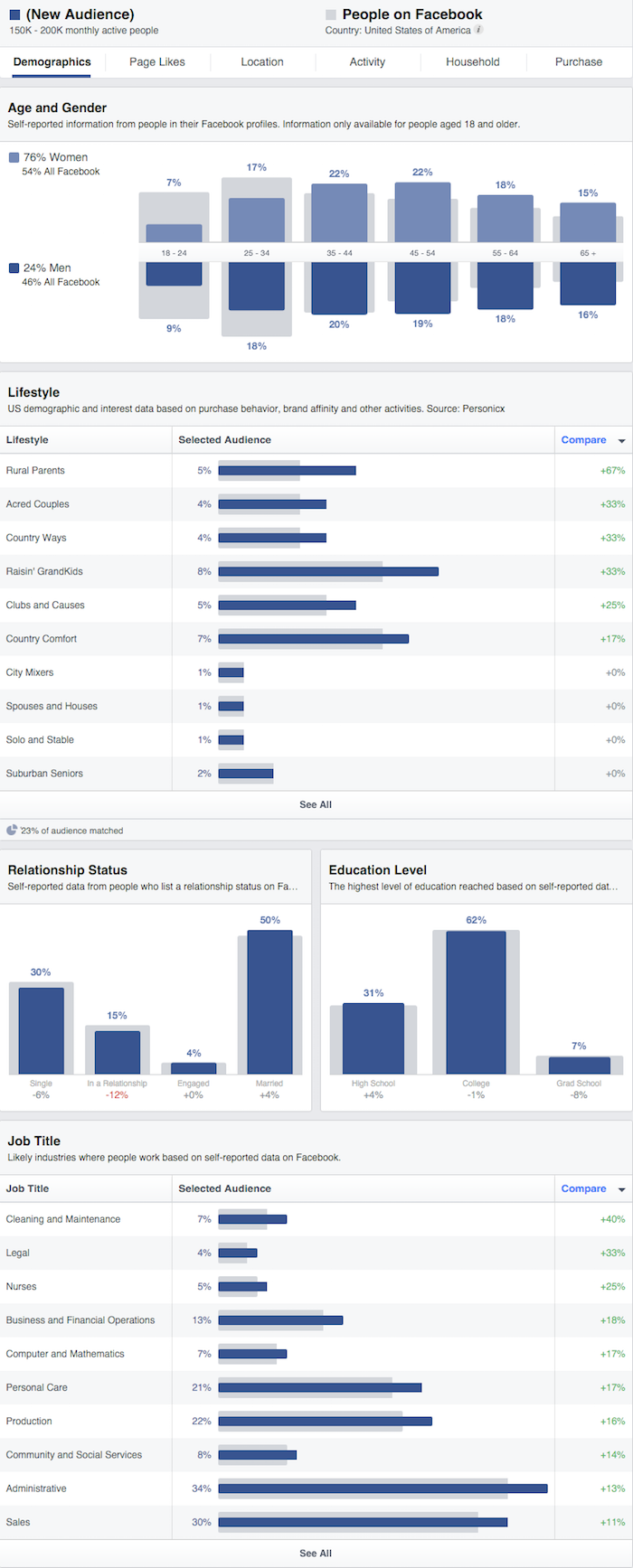
And that's just the beginning.
In Google Analytics, you can find out how many people have viewed your content and how long they stuck around.
In Facebook Insights for your page -- you can see how many people have liked, loved, and have been wowed by your content thanks to the new Facebook Reactions.
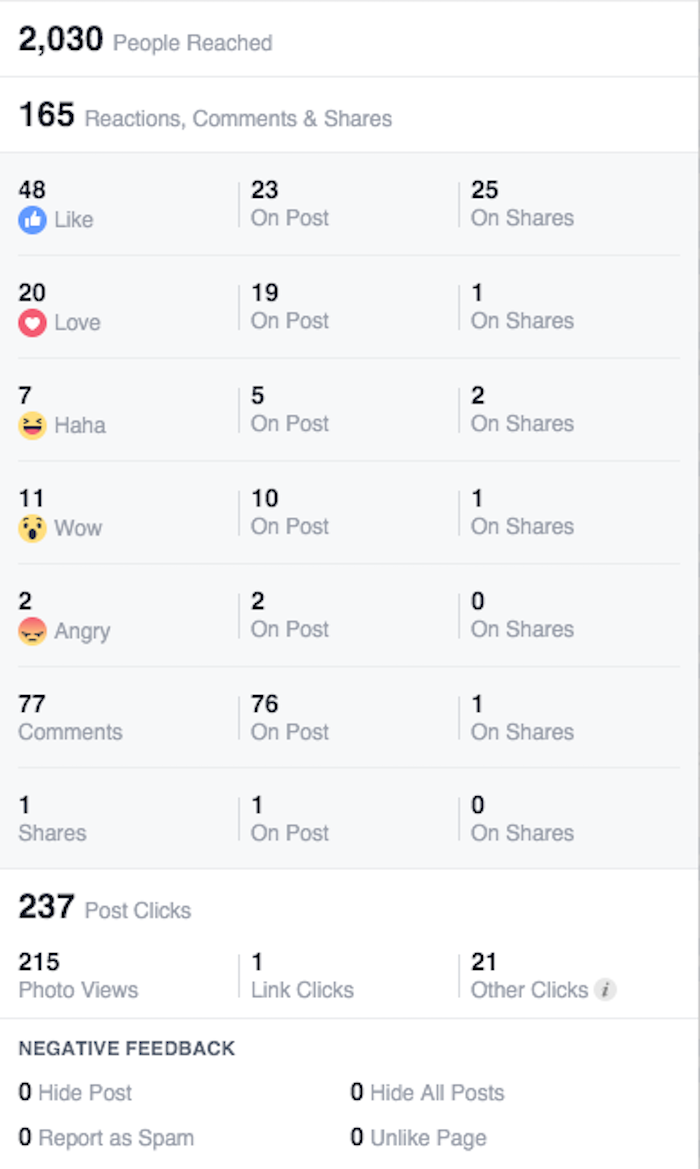
Using Twitter Cards to make tweets with your content look even more fabulous?
If so, you can hop over to your Twitter Analytics to learn even more about the impression your tweets are making across the Twittersphere.
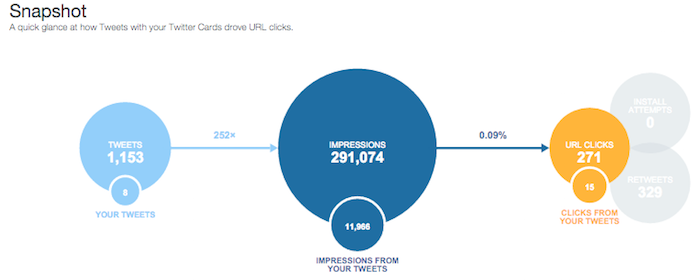
You can also see who your most valuable content fans are so you can start appreciating them more.
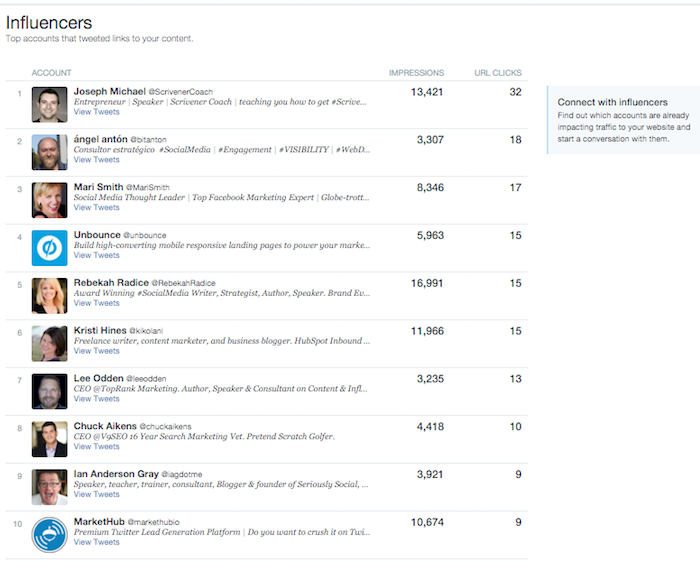
Use Social Media to Market Your Small Business -- Branding
While many people use multiple social networks -- everyone has their favorite. It's the network they spend the most time on.
It might be Facebook, Twitter, Instagram, LinkedIn, Snapchat, Periscope, Pinterest, Peach, or whatever else pops up in the market.
This is why businesses should invest in a wide variety of social networks.
The number of social networks you have to invest in depends on your industry.
If you're a big brand targeting mobile-loving generations, then congratulations. You probably need to brand yourself on all of them. Because you never know which network is going to be your customer's favorite.
Here's a quick and easy formula for successful branding across all social channels:
Use a common username across all social networks.
Social networks like Snapchat expect people to know your username to follow you.
It will help you grow your audience if you are tacobell on Twitter, Facebook, Pinterest and Snapchat.
Use a common profile photo across all social networks.
That way, there's no second guessing it's you when someone sees your update in their news feed or your profile pic in their search results.
Use a common cover photo across all social networks.
This creates clear, consistent messaging.
Use a common short description of your brand across all social networks.
Again, this is to create clear, consistent messaging.
Include a link to your website across all social networks.
This is so people can converge on your owned online property.
Post AT LEAST 1 update per day on your top social networks -- and a few updates per week on the rest.
This last one may sound challenging, but it doesn't have to be.
Facebook and Twitter are likely going to be the top networks for most businesses.
Post Planner has you covered for easily updating multiple times per day on those.
Then just remember to visit the other networks on occasion and throw them an update.

Use Social Media to Market Your Small Business -- Building Community
No matter what type of community you want to build for your small business or startup -- social media is the place to build it.
Your best options for communities are Facebook groups and LinkedIn groups.
Here are the advantages of each in a nutshell.
With Facebook groups:
You have the advantage of 1 billion active daily users. This means most of your members are likely logging in on a daily basis, giving them an opportunity to see and engage with group posts.
Not only that, but Facebook group posts generally get more organic reach than Facebook page posts.
This makes them a better way to reach your target audience.
You also have the ability to:
- Create secret groups
- Share files with members
- Tag them in discussions
- Use third-party tools like Grytics to get analytics on your group's activities
With LinkedIn groups:
You have the advantage of being able to email members of your group (those who haven't turned off email notifications from your group).
That means if you build a LinkedIn group with thousands of members, you have built a mailing list of thousands of members.
While not as great as a traditional email list that you own -- it's better than none.
But in comparison to Facebook groups, LinkedIn groups are not as active and have fewer features.
With those things in mind, here are the types of communities you can build using either Facebook or LinkedIn groups.
- Interest-based communities your ideal customers would join (for customer acquisition)
- Local communities your ideal customers would join (for customer acquisition)
- Interest-based local communities that your ideal customers would join (for customer acquisition)
- Beta testing communities for your products your VIP / early adopters would join (for customer retention)
- User support communities for your products that your current customers would join (for customer retention)
- Private communities for event attendees (for customer acquisition and retention)
Of course, there are hundreds of different ways to use social media groups. These are just a few that small businesses or startups would benefit from!
Use Social Media to Market Your Small Business -- Competitor Research
One of my favorite ways to use social media is for competitor research.
This is where the public nature of social media activities works in your favor.
You can learn a lot about your competitors in a short amount of time using both free and paid tools.
For example, with the new Facebook Reactions, you can find out what your target audience thinks about the content your competitors are sharing. (or the advertisements they are publishing)

You can also use the Facebook Audience Insights we showed you earlier on your competitors.
Learn about their fans' demographics, likes, dislikes, and other details.
Do this by entering your competitors as an interest.
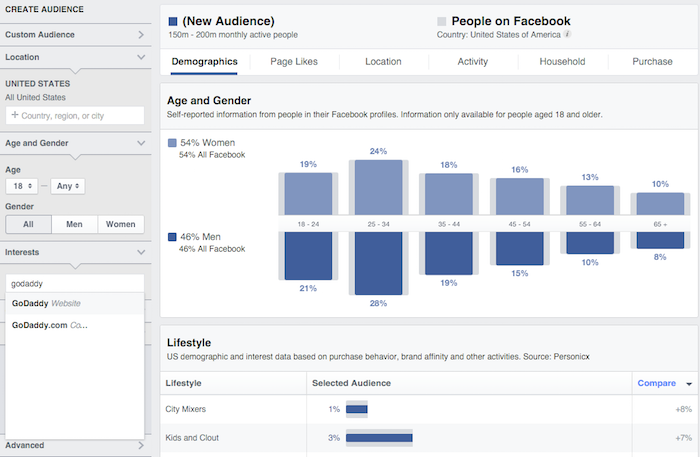
You might have competitors with small social media audiences.
For those -- you can use the free reports from Simply Measured to learn more about them on select social networks.
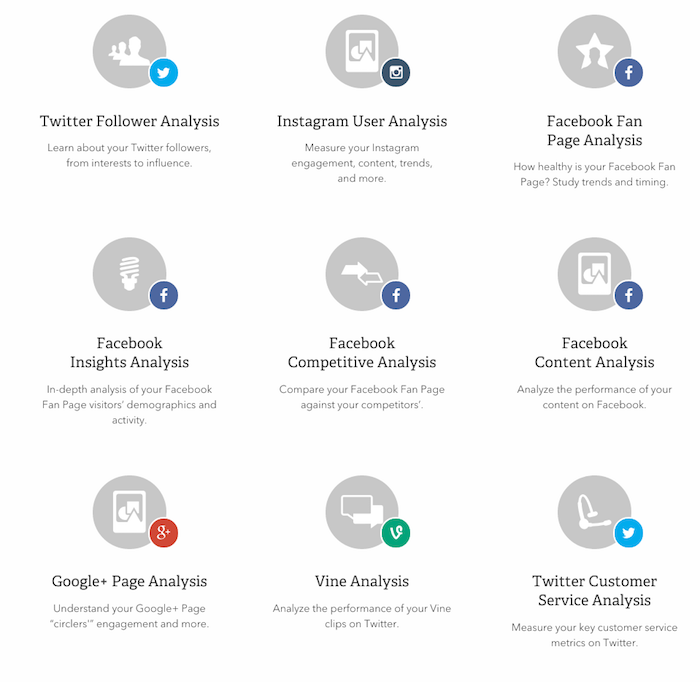
And for those who want to dive deeper into competitor research and monitoring, there are premium tools like Rival IQ that can't be rivaled.
You can use their platform to find out how you stack up against your competitors with:
- Social audience size
- Social audience engagement
- Top content on the top social networks
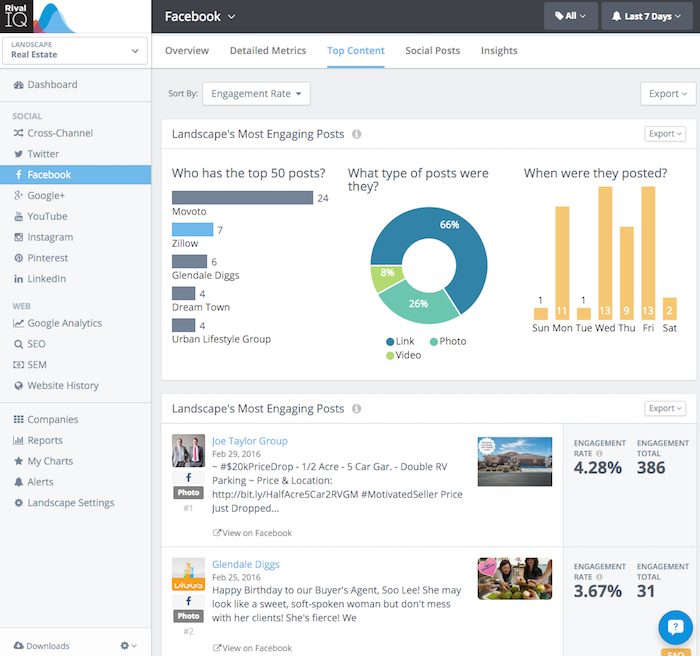
It's the type of analysis you could do by hand in a spreadsheet -- but the time you will save by using this tool will be well worth it.
Instead of wasting time collecting data, spend that time applying what you learn to your own social media marketing strategy.
Use Social Media to Market Your Small Business -- Content Marketing
If you're creating any kind of content -- you need social media to promote it.
Why?
Because there's no point in creating content if you're not getting readers, listeners or viewers to that content.
Social media is the best way to promote content.
If you have an audience -- you can promote your content by sharing it to your top social profiles and pages.
I recommend starting with 2 to 3 times a day at first.
Then for ongoing promotion, share it once a day, once a week, or once a month thereafter.
If you don't have an audience (or for those who want to reach beyond their current audience) -- you can promote your content by targeting your ideal readers, listeners or viewers through social media advertising platforms.
Either way, social media ensures the hard work you put into your content doesn't go to waste.
Use social media analytics tools like BuzzSumo to see which content was most popular based on social shares.
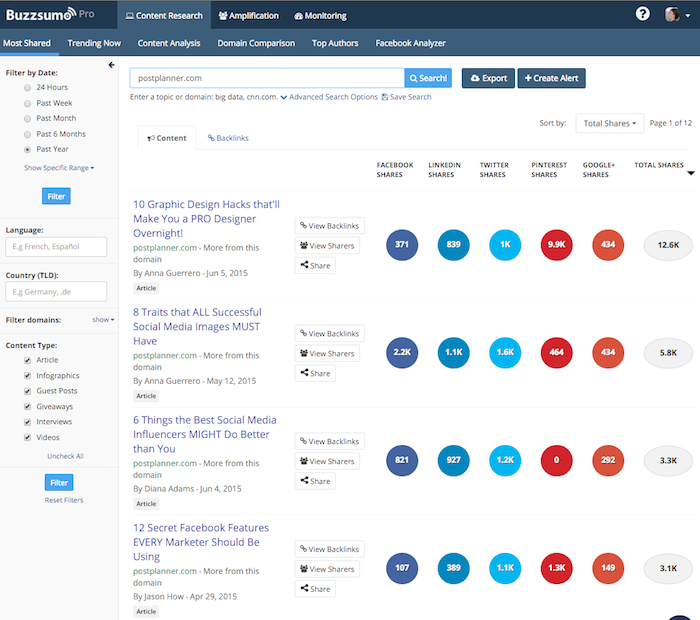
You can even go further into your analysis to see how your most popular content on social media has affected your SEO in terms of gaining backlinks.
To do this -- use tools that will correlate the data like Impactana.
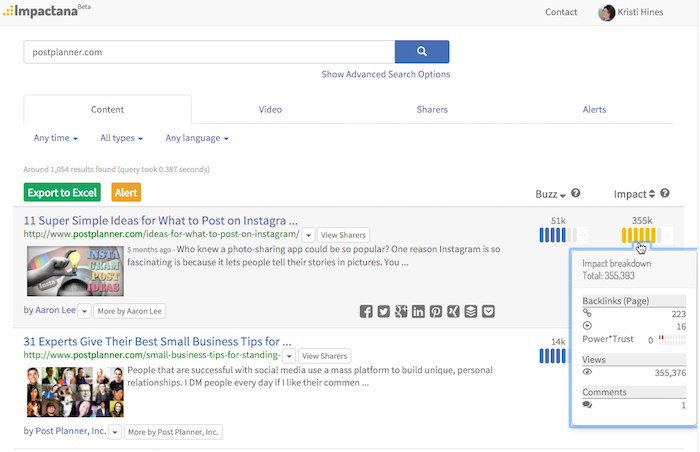
In the above example, a post with 51K social shares gained 223 backlinks and a whopping 335K views!
Now that's how you show the benefits of social media to your content marketing, SEO and traffic generation in one swoop!

Use Social Media to Market Your Small Business -- Customer Service
We know that people like to use social media for customer service.
The evidence in certain industries is public.
You can check out the latest conversations with @bestbuysupport on Twitter, UPS on Facebook, and Staples on Instagram (see comments on some of their posts) for examples.
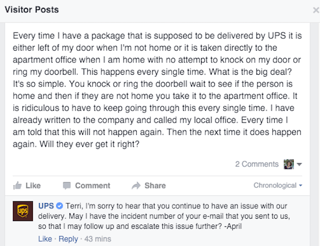
People like communication to be fast.
If they can avoid a phone call and get an answer somewhere else faster (like their favorite social media platform), they'll try there first.
Now granted, Instagram is a bit of a stretch for customer service issues (most people will stick with Twitter and Facebook).
That's why it's good to offer people multiple options when it comes to contacting you on both networks.
On your Facebook page, you can allow private messaging and allow visitors to post to your page in your Page Settings.
These options will hopefully keep customer complaints off your regular Facebook page posts.
And, for local businesses -- out of your reviews.
On Twitter, you can go to your Privacy Settings and allow anyone to direct message you.
This may keep complaints off of people's public tweet streams.
By allowing private messaging, you'll give people another way to contact you for customer service issues.
If you respond to them quickly, it'll ensure your customers stay happy and problems stay private.
And that's ultimately what you want -- less public complaints and happy customers.
Even if the complaints are public -- a fast, polite response will go a long way at keeping your customers happy.
You'll also be showing the rest of the world how awesome your customer service truly is.
Plus, replying with a tweet or Facebook post will likely be simpler and faster than a phone call.
This will give your customer service team time to handle more issues efficiently.
Use Social Media to Market Your Small Business -- Email Marketing
There is a lot of debate about owned versus "rented" property on the web.
While it's important to build your social media presence -- you should also consider steering your audiences to something you have more control of.
Namely -- your email list.
Fortunately, social media can come in pretty handy for building an email list.
All you need is a lead magnet. A lead magnet is that one free thing you give to someone in exchange for their email address.
It may be a discount code for 10% off a first order or free shipping.
It may be a checklist for how to create a great Facebook page. It may be a free report about the state of your industry.
Whatever it is, make sure it's free and appealing to the people you want on your email list.
Take that free and appealing thing and put it on its own landing page dedicated to nothing but capturing email addresses.
Here's an example:
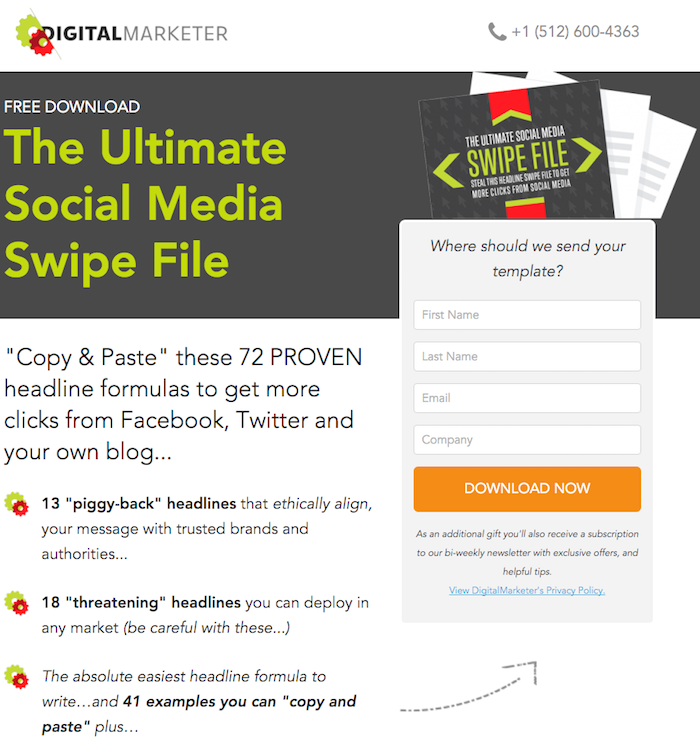
Now, take the URL for your lead magnet landing page and use social media to build your email list in a multitude of ways.
When I say a multitude, I mean the following...
- Share your lead magnet on your Facebook page and pin that post to the top of your wall so everyone sees it.
- Share your lead magnet in your Facebook group (if applicable) and pin that post to the top of the group wall so everyone sees it.
- Install the Woobox Custom Tab (free) on your Facebook page, and have it effectively import the content from your lead magnet landing page to your Facebook page or just redirect to the lead magnet landing page when someone clicks on the tab.
- Create a Facebook ad that promotes your lead magnet to your ideal email subscribers. Try the new Lead Generation Ads for mobile too!
- Create a custom audience on Facebook of your website visitors. Advertise your lead magnet to those visitors.
- Tweet your lead magnet and pin it to the top of your Twitter profile.
- Create a Twitter ad that promotes your lead magnet to your ideal email subscribers. Try the Lead Generation Card too!
- Create a tailored audience on Twitter of your website visitors. Advertise your lead magnet to your visitors.
- Create a great image for your lead magnet that you can pin on Pinterest. Link it to your lead magnet landing page.
- Create a great image for your lead magnet that you can share on Instagram. Use the lead magnet landing page URL in your bio.
- Share your lead magnet on LinkedIn.
- Email everyone in your LinkedIn group about your lead magnet.
- Create a LinkedIn ad that promotes your lead magnet to your ideal email subscribers.
As you see, there are lots of ways to build your email list through social media.
Another way to use social media in conjunction with email marketing is through custom audiences.
You can use the emails you've collected to create custom audiences on Facebook and tailored audiences on Twitter.
This will allow you to advertise to your email subscribers (and unsubscribers, if you choose).
The key to this is not to say anywhere in your ad or any copy thereafter that the person was targeted because they are an email subscriber or unsubscriber.
That's something they don't need to know.
Also, speaking of custom audiences on social media and emails, you can still export your LinkedIn contacts and create custom audiences on Facebook and tailored audiences on Twitter based on those.
Again, don't specify that's where you got those emails in your ads or otherwise.
Use Social Media to Market Your Small Business -- SEO
Surprisingly, social media marketing can benefit your SEO in many ways, but maybe not the ones you've considered.
For example, social media benefits content marketing by drumming up social shares -- which leads to links and traffic.
Moz and Buzzsumo partnered for a study on this. They found that with certain post types, a high volume of social shares usually comes with a higher volume of links from different referring domains.
Another way social media can help with SEO is by helping you dominate your brand's first page of search results.
Let's take a personal brand, like Mari Smith.
Her first page of search results includes (in order):
- her website
- her Twitter profile
- a block of image results
- her Facebook page
- her LinkedIn profile
- a blog post about her
- her SlideShare profile
- her YouTube channel
- an interview with her
- and her Google+ profile
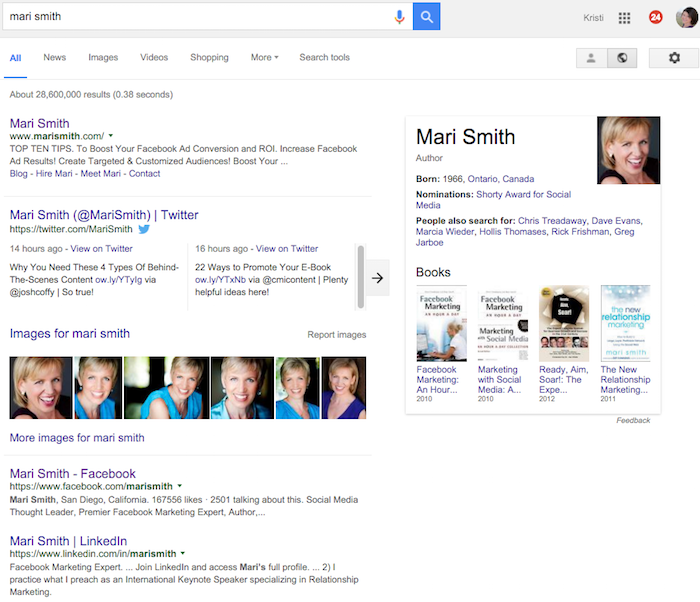
Now let's take a professional brand, like Logitech.
Their first page of search results includes (in order):
- their website
- their Twitter profile
- their Wikipedia page
- their latest news block
- their Facebook page
- their YouTube channel
- and their products on Amazon
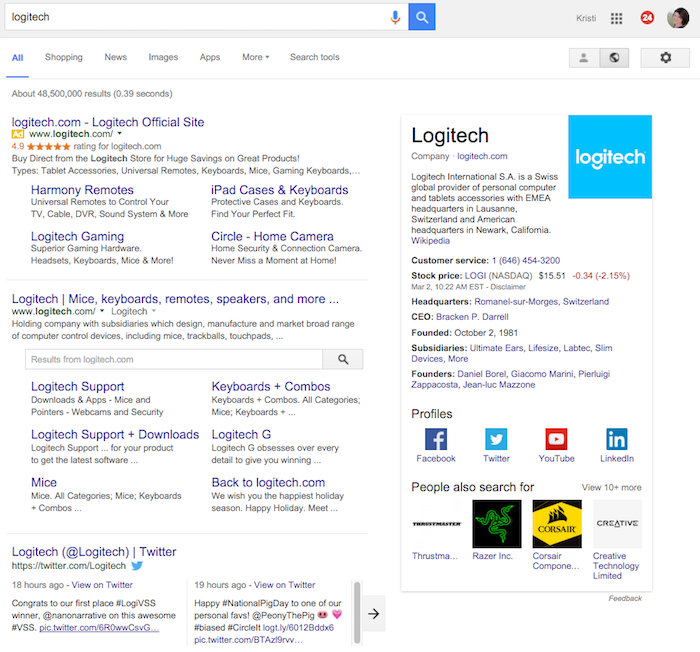
Social media should be important to your marketing strategy if reputation management is important to you.
Having complete and active social media profiles can help you dominate the first page of search results for your name.
Combine that with guest posts, interviews and other content with your name in the title. You'll have a reputation in search that will be hard to tarnish!
Last but not least -- you can use social media to cozy up to people who might link to your website.
These are usually bloggers and journalists in your niche that write about similar people, businesses, products, services, etc.
Connect with them and build relationships with them. Be valuable members of their community in the following ways:
- Comment on their articles when you have something insightful to say. Don't just comment to comment, and don't just comment to market yourself.
- Follow them on Twitter, answer questions when they have them, and share their articles with their usernames included in the tweet.
- Follow them on their Facebook profile. Comment on their public posts if they allow it.
- Find out what public and closed groups they belong to on Facebook using the search groups that John Smith belongs to and join them. Not all of them, because that might be a little too creepy (and joining groups too quickly can get you in the Facebook penalty box), but several of them so that you can find ones where the person is actively engaging. Then participate in some of the same discussions. Use the search box in the group to find the discussions they participate in.
- Go to their LinkedIn profiles to see if they have groups they've joined listed upon them. Join those groups, find discussions they participate in, and engage.
- Follow them on other various networks that they publicly share like Instagram, Snapchat, etc. and engage with them there if possible.
The goal is to get on their radar through social engagement.
Chances are, if you make a good enough impression, they'll take note of you and what you do.
Then if they're ever in need of a resource that relates to what you do, your business, your product or your service -- you might end up in one or more of their articles. And links equate to huge SEO value.
In Conclusion
As you can see, the best ways to use social media to market your small business or startup go beyond just social media marketing itself.
Social media can be used to support just about all of your marketing goals.
If you're a social media professional, be sure to keep these things in mind the next time you're pitching social media to your boss or your clients.
You'll be sure to sell them on a social media marketing plan!
Now it's your turn... what are some other ways you use social media to market your company?

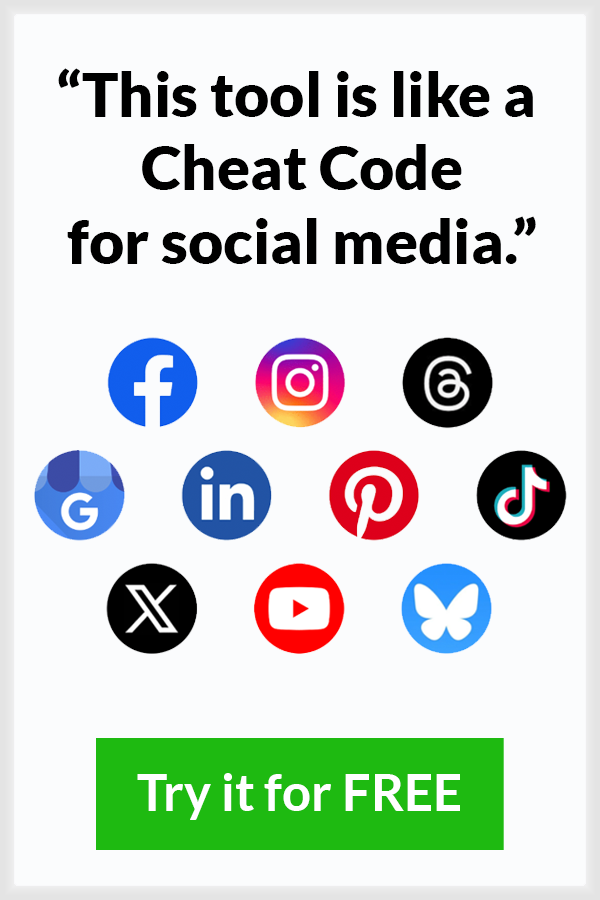



ViewHide comments (3)